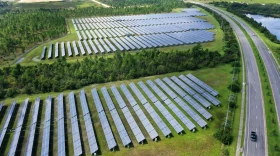-
Hundreds of medical centers along the Atlantic and Gulf coasts face serious risks from even relatively weak storms as climate change accelerates sea-level rise — not to mention big ones like Category 4 Hurricane Ian.
-
Hurricane Ian roars through Florida, devastating the southwest and flooding other parts of the stateThis week: A look at Ian’s impact as we check in with cities across the state; a former FEMA official brings us up to date on the emergency response effort; will Florida be able to handle all of the insurance claims; and how much is climate change to blame for the stronger and more intense storms the state is facing?
-
Abnormally hot water in the Gulf of Mexico helped Hurricane Ian gain strength. Rapidly intensifying major hurricanes are more likely as the Earth gets hotter.
-
Can electric vehicles help in our fight against climate change? It's not a simple answer.
-
The analysis uses data gathered from utility companies around the country and defines a major power outage as one impacting more than 50,000 customers.
-
As intense heat becomes more common around the world, the potential threat to biodiversity increases. One species at particular risk to a warming climate is found on the beaches of Florida.
-
Rising seas will shift tidal boundaries, leading to the loss of taxable properties, according to a new study. This is expected to impact the tax base of hundreds of U.S. coastal counties, with Florida being the state most affected.
-
The Biden administration's new climate package includes major incentives for cleaner energy. But some say it doesn't do enough for communities of color that are affected the most by climate change.
-
As storm flooding worsens, federal report finds Florida has the most to lose along SE Atlantic coastThe 4-year study by the U.S. Army Corps of Engineers found storm surge flooding alone could amount to $24 billion annually with three feet of sea rise, thanks to a warming planet.
-
Hurricane season doesn’t officially start until June 1, but in recent years named storms have been popping up ahead of schedule more and more often.
-
Over the last few decades, corals on the reef have been hammered by warmer water and ocean heat waves, disease and hurricanes. If the U.S. loses its reef tract, it loses a powerful defense against more intense hurricanes fueled by climate change.
-
Play Live Radio
Next Up:
0:00
0:00
Available On Air Stations












